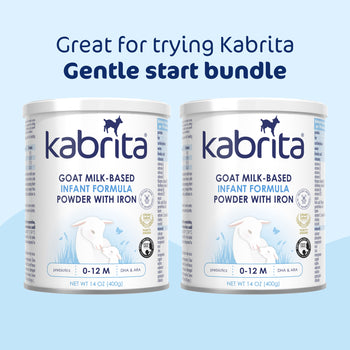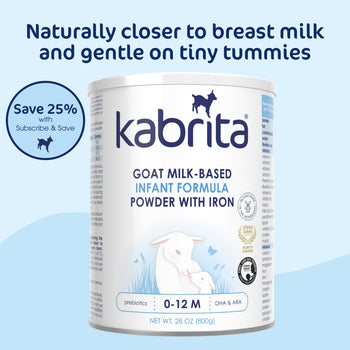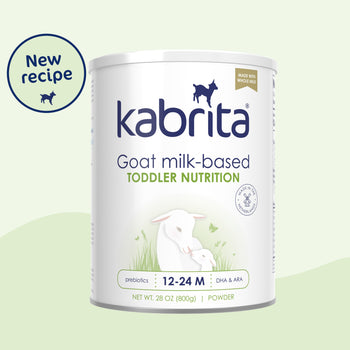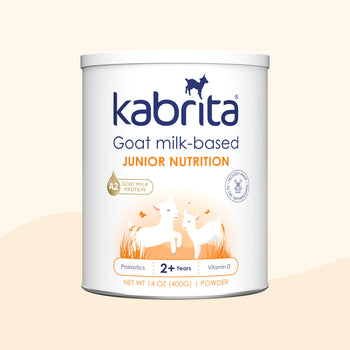Goat Milk Formula Comparison: How It Stacks Up Against Other Formulas
By Kelsey Kunik, RDN
Registered Dietitian Nutritionist
When you compare infant formulas, it can feel like a never-ending maze of labels, ingredients, and claims–especially when you’re trying to find the perfect nutrition solution for your baby. Goat milk-based formula has been gaining popularity as more and more parents notice the beneficial effects of its digestibility and similarity to breastmilk. “It contains all the nutrients, vitamins, and minerals that babies need to grow and thrive with the benefit of being naturally gentler and, overall, better tolerated by babies than cow milk-based products,” says Ari Brown, MD, FAAP.
If the idea of goat milk-based formula is new to you, you may wonder how it compares to other popular infant formulas on the market. Whether you’re looking for a formula that’s closest to breastmilk or searching for an option for your baby’s sensitive tummy, goat milk infant formula could be the perfect solution.
Keep reading to learn how goat milk formula compares to the most common formula types available on the market today, including cow milk formula, hypoallergenic formulas, and plant-based options.
Table of contents
Cow Milk Formula vs Goat Milk Formula
Hypoallergenic & Specialty Formulas vs Goat Milk Formula
Plant-Based Formulas vs Goat Milk Formula
Standard Milk vs Goat Milk Formula
Infant Formula Comparison Chart
Comparing Goat Milk Formula to Standard Cow’s Milk Formula
For years, cow milk formula has been the go-to for families in the United States, but goat milk formula has been making waves as an alternative choice, especially for babies with sensitive tummies. While both cow and goat milk formulas meet your baby’s nutrition needs, goat milk formula may have an advantage. “The reason why many families worldwide opt for a goat milk-based infant formula is that it is easier for babies to digest,” explains Dr. Brown.
Both formulas contain protein, fats, and carbohydrates, but when it comes to protein, there are some important differences. Goat milk contains more beta-casein protein, which is more similar to that found in breast milk, while cow’s milk is higher in Alpha-S1 casein (commonly referred to as A1 protein).1 The proteins in goat milk are digested at a similar rate as the protein in breastmilk, while the proteins in cow milk take longer to digest. 2
As for the carbohydrate differences, goat milk is also naturally higher in prebiotics to support your baby’s gut microbiome.3
Goat Milk Formula vs Cow Milk Formula
Deciding between goat milk formula vs cow milk formula often comes down to comfort for your baby. Both cow milk formula and goat milk formula are endorsed by the American Academy of Pediatrics (AAP) and the FDA, but there are some differences between the two.4 What makes goat milk formula easier to digest is the difference in protein composition.
Why Change to Goat’s Milk Formula from Cow’s?
If your baby doesn’t seem to be tolerating cow milk formula, but is otherwise healthy, goat milk formula may be the solution. “Kabrita is a great choice if a baby is on a cow milk-based infant formula and is fussy, uncomfortable, gassy, or constipated.These are often babies who are sensitive or have trouble tolerating cow milk protein, and for many, these symptoms seem to improve when they use Kabrita, a goat milk-based infant formula,” says Dr. Brown.
Here are some potential reasons you may want to try switching your baby from cow’s milk formula to goat milk formula:
- Constipated
- Gassy
- Bloating
- Fussy and uncomfortable
- Colic
NOTE: Goat milk-based infant formulas are not appropriate for infants with diagnosed cow milk protein allergy (CMA).
Is Goat Milk Formula Better than Cow's Milk Formula?
Both formula types, goat milk and cow milk, are endorsed by the AAP and the FDA as safe options for infant nutrition. While they both have all of the nutrients your baby needs for growth and development during the first year of life, goat milk formula may be a more gentle option for babies with sensitive tummies.
Goats Milk Formula vs Hypoallergenic Formula and Specialty Formulas
While goat milk formula is ideal for a baby who has a sensitivity to cow milk-based infant formula, hypoallergenic (HA) formulas are designed for babies who have a diagnosed cow milk allergy (CMA), explains Dr. Brown. Many parents may suspect that their baby has an allergy to cow’s milk if they are fussy and unable to tolerate traditional formula, but only about 3 percent of infants have a true cow milk allergy.5
“Hypoallergenic (or “HA”) formulas are extensively hydrolyzed proteins, meaning that a cow milk protein base has been pre-digested into tiny molecules called peptides,” says Dr. Brown. Because Nutramigen and other hypoallergenic formulas have an off-tasting flavor, are extremely expensive, and are quite restrictive, they’re not recommended for infants unless they have a true CMA.
Goats Milk Formula vs Nutramigen
Nutramigen is a hypoallergenic formula made with cow milk protein that has been pre-digested and is safe for infants with a CMA.
Goat Milk Infant Formula vs Plant-Based Formulas
Because of ethical or health reasons, parents may choose a plant-based formula for their baby instead of a formula made from cow or goat milk. Parents who follow a vegan diet may decide to choose a plant-based formula as the best option for their family. “Soy-based infant formula has the longest track record for safety and growth and is recognized by the AAP and the FDA as appropriate nutrition for a baby’s first year,” says Dr. Brown. Pea protein-based products have started to make their way on the market, but the FDA and AAP have yet to endorse these products or recommend them as a suitable solution for infant nutrition.
Soy-based formulas are not recommended for infants under 6 months of age with a cow milk protein allergy, as 10 to 14 percent of these infants also have reactions to soy because of cross-reactivity.6 However, soy-based formula is the best nutritional option for babies with a rare disorder called galactosemia, where they are unable to digest galactose, a byproduct of lactose, explains Dr. Brown. Soy-based infant formula works in this case because it gets its carbohydrates from corn syrup solids instead of lactose. In the case of this rare condition, goat milk formula would not be a safe option.
Comparing Goat Milk to Plant-Based or Soy Formulas
Goat milk infant formula is recommended for all infants from newborn to 12 months of age, while soy milk is endorsed as a suitable option for babies unable to digest lactose, as per the AAP. Both of these types of formulas will meet all the nutrition needs of your baby during the first year of life. Goat milk gets its protein from whey and casein and carbohydrates primarily from lactose, while soy formula uses soy protein and sugars like corn syrup as the main carbohydrate source. Almond milk is not used for infant formula because it does not contain suitable protein for infant growth and development. There are currently no almond milk infant formulas available on the market.
Comparing Milk to Goat Milk Formula for Infants
You may wonder why your baby needs a specialized formula when milk is readily available. While milk is a safe and nutritious option for toddlers and babies over 12 months of age who get plenty of other nutrition from whole foods, it’s not a safe option for babies under 12 months. While milk from cows and goats contains protein, carbohydrates, and fats, along with some other nutrients like calcium, when compared to infant formula it does not have all of the essential vitamins and minerals or the correct ratios of protein, fat, and carbohydrates that your baby needs for growth and development during the first year of life.
Goat milk infant formula and cow milk infant formulas sold in the United States are both regulated by the FDA and formulated with the correct amounts of vitamins and minerals, including iron, calcium, and B vitamins, along with nutrients like protein, carbohydrates, and healthy fats that help your baby grow and develop safely. During the baby formula shortage in 2022, we were reminded how dangerous it is to feed your baby anything besides breastmilk or FDA-regulated infant formula as babies given homemade infant formulas suffered from side effects like low calcium and food-borne illness.7
Can Infants Have Goat’s Milk or Cow’s Milk Instead of Formula?
When we look at cow milk or goat milk vs formula, no matter which type of milk you’re considering, they’re just not comparable to milk-based infant formula. “Neither goat milk nor cow milk are appropriate substitutes for human milk in the first year of life,” says Dr. Brown, “Unmodified, they contain an inappropriate amount of protein and lack essential vitamins and minerals that babies need to grow.” The same is true for other types of “milks” like those made from soy, oat, almond, cashew, and peas.
Cow Milk or Goats Milk vs Formula For Babies
While cow and goat milk are used as a base to create baby formula, they’re not suitable on their own. As formulas, however, “they are modified with nutrients, vitamins, and minerals to meet the 30 essential nutritional requirements that babies need to grow and thrive in their first year of life,” says Dr. Brown.
Infant Formula Comparison Chart
There are five different types of formula that the AAP endorses for infant nutrition: cow milk, goat milk, soy-based, extensively hydrolyzed formula, and specialty formulas made for babies with specific disorders, diseases, or needs.4
One of the most overwhelming tasks for many parents is deciding which infant formula is right for their family. Fortunately, the rise in popularity of goat milk formula has helped many infants with sensitive tummies find relief from gas, bloating, and other uncomfortable digestive concerns. As a parent, you can speak with your baby’s pediatrician about which type of formula is best for your baby during the first year of life, whether you’re starting them out as a newborn, combo-feeding, or transitioning from breastmilk.
References
- Park, Y. W., & Haenlein, G. F. W. (2021). A2 bovine milk and caprine milk as a means of remedy for milk protein allergy. Dairy, 2(2), 191–201.
- Maathuis, A., Havenaar, R., He, T., & Bellmann, S. (2017). Protein digestion and quality of goat and cow milk infant formula and human milk under simulated infant conditions. Journal of Pediatric Gastroenterology and Nutrition, 65(6), 661–666.
- Van Leeuwen, S. S., Poele, E. M. T., Chatziioannou, A. C., Benjamins, E., Haandrikman, A., & Dijkhuizen, L. (2020). Goat milk oligosaccharides: Their diversity, quantity, and functional properties in comparison to human milk oligosaccharides. Journal of Agricultural and Food Chemistry, 68(47), 13469–13485.
- Choosing a baby formula. HealthyChildren.org.
- Freidl, R., Garib, V., Linhart, B., Haberl, E. M., Mader, I., Szépfalusi, Z., Schmidthaler, K., Douladiris, N., Pampura, A., Varlamov, E., Lepeshkova, T., Beltyukov, E., Naumova, V., Taka, S., Nosova, D., Guliashko, O., Kundi, M., Kiyamova, A., Katsamaki, S., & Valenta, R. (2022). Extensively Hydrolyzed Hypoallergenic Infant Formula with Retained T Cell Reactivity. Nutrients, 15(1), 111.
- Kipfer, S., & Goldman, R. D. (2021). Formula choices in infants with cow’s milk allergy. Canadian Family Physician, 67(3), 180–182.
- Program, H. F. (2021, February 24). FDA advises parents and caregivers to not make or feed homemade infant formula to infants. U.S. Food And Drug Administration.



